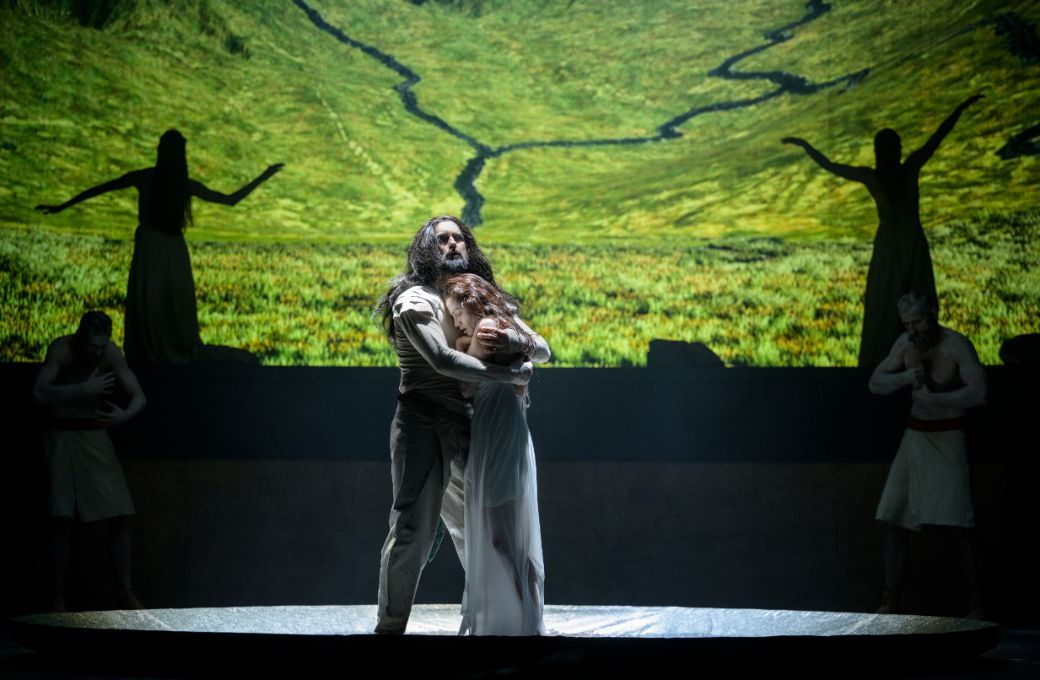Digging into its archives, Prague’s National Theatre chose a curious piece to showcase forgotten chapters of Czech musical history. Otakar Ostrčil’s 1921 opera The Legend of Erin recounts a story from Celtic mythology with music derided as non-Czech at the time, based on a failed play that closed after just four performances. The opera didn’t fare much better, enjoying a brief run in Brno and then lasting for just seven performances in Prague. Still, there’s a case to be made for Ostrčil as a noteworthy composer ahead of his time. And there are moments to savor in a revival hampered by some serious built-in impediments.

The first of these is a convoluted plot requiring an extensive backstory that the program takes nine full pages to provide. Onstage, two parallel storylines unfold: Midac, the son of King Colgan of Lochlainn, is seeking revenge for his father’s murder. Midac suspects Finn, leader of the Fianna band of warriors, who comes to the court of High King Kormac seeking the hand of his daughter Grania in marriage. But Grania has eyes only for Dermat, a powerful warrior in Finn’s retinue, who is persuaded to betray his liege and run off with her. Magic powers, Druids and deceit become part of a volatile mix that ends in tragedy for everyone involved.
The opera itself is cumbersome, with a libretto, drawn directly from the play, that is overwritten and weighty, and an awkward structure, opening with a flashback by Kormac that poses a significant hurdle both for the audience and performer – 12 straight minutes of singing and speaking. What little action there is throughout the remainder of the opera moves at a snail’s pace, with no choral pieces to add variety and vitality, robbing all but the final act of any dramatic tension.
Director Jiří Heřman doesn’t provide much relief in the first two acts. Heřman is the king of slo-mo, filling the stage with extraneous characters who rearrange sets and walk around with props (a handheld Celtic harp dominates this production) very slowly, as in a dream. On the plus side, this lends movement to what would otherwise be long, stagnant singing segments in Erin. But it’s also distracting, especially in an unfamiliar work where it’s an effort just to keep up with the basic storyline. Heřman mercifully abandons that approach for much of the third and fourth acts, stripping the stage of all but fiery confrontations between the main characters, which provide the most powerful moments of the evening.
He is helped by a clever set (by Dragan Stojčevski) that frames the piece with a semicircular tiered wall overlooked by a large video screen, both containing and supplementing the narrative. Swooping footage of verdant landscapes rescues Kormac’s long opening monologue, though the screen is oddly underused after that, mostly as backlighting to silhouette dancers and figures striking symbolic poses. The primary lighting is less effective – sometimes it’s difficult to tell who is singing. Still, the overall impact of the set gives the production a larger dimension that it otherwise lacks.
A uniformly strong cast carried the evening. František Zahradníček showed a commanding voice and remarkable stamina as Kormak, and Seth Carico was equally powerful, even fearful at times, as Finn. Svatopluk Sem (Finn’s son, Ossian), Jiří Brückler (Midac) and Peter Berger (Dermat) all provided sturdy support, with Berger a bit overwrought in the acting department. But the real vocal standout of the evening was Alžběta Poláčková (Grania, the sole female), whose earnest soprano held its own amid five low male voices. Her acting outclassed them all.
Robert Jindra did deft work conducting a thoroughly modern score that still sounds bold and challenging, with mostly woodwinds and horns plying a steady stream of dissonance. Instead of offering melodies for singers to follow – there are hardly any melodies in the entire opera – the music sets tones and moods, mostly of unease and distress, and is wildly expressive building drama and punctuating climaxes. All of which may have been too radical for early 20th-century audiences, though it’s worth noting that no less an expressionist than Alban Berg was a fan.
To judge Ostrčil solely on the basis of Erin would be unfair. He wrote other, more successful pieces, including five additional operas. He was also a greatly admired director and chief conductor at the National Theatre for 15 years, until his untimely death in 1935. That his life and work are worth revisiting and celebrating is beyond question. With a few judicious trims and less lethargic pace, Erin could be an enlightening and entertaining way to honor his memory. It’s unfortunate that this production falls short.


